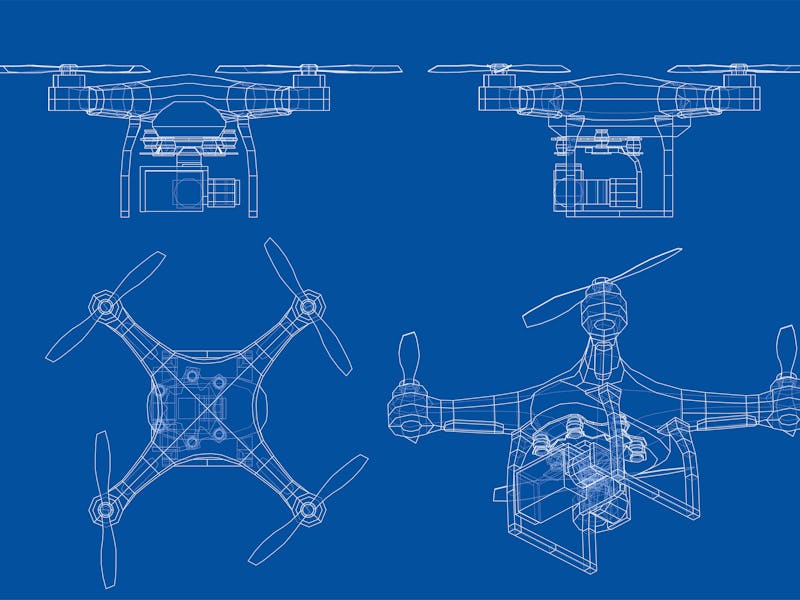The U.S. government is worried China is using drones to commit espionage
The Interior Department is restricting the use of drones made in China or with Chinese parts for fear they might be used for espionage.

The Interior Department has announced it will be restricting the use of drones made in China and drones with parts that were made in China due to espionage fears. The department has roughly 800 drones that will fall under these restrictions, and they will now only be used to help first responders during a natural disaster and other emergency scenarios.
Interior Secretary David Bernhardt told the Wall Street Journal that he "decided to issue the order after investigating the potential security risks from drones." The order Bernhardt signed notes that the data collected by these drones could be "valuable to foreign entities, organizations and governments."
The secretary had decided to pause the use of these drones months ago, and this order makes it an official policy that these drones will not be used in most scenarios until further notice.
In a statement, Interior spokesperson Carol Danko said that these types of drones have important uses but national security has to take priority.
"After an ongoing review of Interior’s drone program, Secretary Bernhardt issued a Secretary’s Order today, affirming the temporary cessation of non-emergency drones while we ensure that cybersecurity, technology and domestic production concerns are adequately addressed," Danko said. "Drone use for non-emergency operations will remain grounded while the Department of the Interior reviews the possibility of threats and ensures a secure, reliable and consistent drone policy that advances our mission while keeping America safe."
As the Journal notes, there have been some within the Interior Department who haven't been entirely happy with the department deciding to ground these drones. They claim it has hampered their ability to survey erosion, endangered species, dams and more. It's a lot cheaper and safer to do these things with drones than helicopters or airplanes.
Though the Interior Department is saying this is about national security, not everyone believes them. Robert Ross, a professor of political science at Boston College who studies Chinese security policy, tells Inverse that China already knows where American dams and other types of critical infrastructure are, so it's unlikely they would use these drones for espionage purposes.
Ross believes this is more about the Trump administration's efforts to "decouple" the U.S. from China in many different ways. He says China can hack us and get valuable information pretty easily, and they have satellites that can take pictures of whatever they want, so they don't need some drones that the Interior Department is using to commit espionage.
"They're inside the Pentagon's computer systems," Ross says. "We are as accessible and vulnerable to their penetration through a variety of mechanisms as much as they are vulnerable to us. In some respects, they're far more vulnerable because their defenses are very weak."
Ross says the Trump administration has been hostile towards China since Trump took office, so this new policy is likely a reflection of that.
"Very early in the administration, it developed what it called an 'all of government approach' to dealing with China. By that, it meant education changes, technology, trade—the whole government has to come into line to deal with the threat that China poses."
Aaron Friedberg, a professor of politics and international affairs at Princeton University who is also a China expert, tells Inverse that there are reasons to be worried about the government using devices made in China overall. He explains that China has a tight grip on the companies that make these products and can use their access pretty much as they please.
"Even Chinese companies that are nominally private or claim to be private are, in the end, at the disposal of the Chinese Communist Party and the state," Friedberg says.
There has been a major debate over if the Chinese smartphone maker Huawei should be sold within the United States because of claims China has used their devices for spying, espionage and other nefarious activities. The Trump administration has partially banned U.S. companies from doing business with the company. Both Friedberg and Ross agree that the U.S. government shouldn't be using Huawei devices.
"The U.S. government should not be using Huawei in its defense-related industries," Ross says.
So while there is some cause for concern when it comes to the government using devices made in China, it seems unlikely these drones the Interior Department has been using to observe wildlife, monitor infrastructure and reach disaster areas present an actual threat. It's more likely this is just part of a long effort by the Trump administration to cut ties between the U.S. and China wherever it's possible to do so.
See also: How an American company potentially exposed U.S. troops to Chinese hackers
Friedberg explains that China is tied to our economic success in many ways, so we can't completely cut ties with the country, but he says we should stay vigilant when dealing with a country that is constantly hacking us and stealing our intellectual property.
"Over the last 30 or 40 years, because of the expectation that China would reform its economic and political system to become more liberal, more like us and not a threat, we've allowed them to become deeply embedded in our economies and our societies," Friedberg says. "Now the struggle is what to do about that."